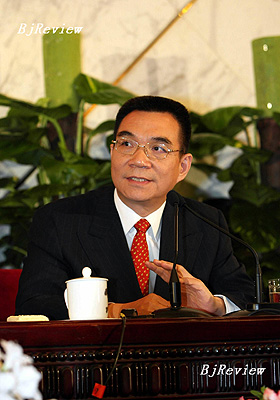|

Three days before the Chinese lunar New Year, Justin Yifu Lin, the founder and Director of the China Center for Economic Research at Peking University, was named by the World Bank as its chief economist and senior vice president for development economics. It is the first time a Chinese has held this position. He replaces Francois Bourguignon, who retired as the World Bank's chief economist last year.
World Bank President Robert Zoellick announced the appointment on February 4, saying Lin would bring to the international development lender "a unique set of skills and experience" and perspective of a developing country on agriculture issues. Zoellick also said he hopes to work with Lin to meet economic challenges in Africa and seek opportunities for developing countries, among other areas.
Lin believes that China's experiences can help the World Bank "shore up its leading role in global poverty reduction" and his appointment will help the World Bank better serve developing countries.
Lin is expected to take his new positions at the World Bank on May 31.
Lin, 56, was born in Taiwan. After graduating from Peking University with a Master's degree in 1982, Lin obtained a doctorate in economics from the University of Chicago in 1986. He returned to China to teach at Peking University in 1987.
For the past decades, Lin has played a crucial role in China's economic modernization. He has undertaken intensive research on rural development, state-owned enterprise reform and income distribution. Many of his proposals on the country's economic development have been adopted by the Central Government. Lin initiated the movement to build a new socialist countryside in 1999, years before it was put into full practice around the country.
Lin has won China's top economics honor, Sun Yefang Award, twice, for his research and writings.
"Having Justin Lin as someone who is very experienced in the field of rural development will both bring us his expertise but also it will probably strengthen our ability to work with China."
World Bank President Robert Zoellick
"The World Bank can only consolidate its role as a leader in the global anti-poverty movement by coming up with effective measures. In this regard, China can provide useful experience."
Justin Yifu Lin
"Indeed, to prevent a threat is always easier than to remove it."
Russian Foreign Minister Sergei Lavrov, telling a UN-sponsored disarmament conference in Geneva on February 12 where China and Russia submitted a joint proposal for an international treaty to ban the deployment of weapons in outer space
"China has really changed the world economic landscape in technology."
Alan Porter, Co-director of the U.S. Georgia Tech Technology Policy and Assessment Center, whose recent study of worldwide technological competitiveness suggests China may soon rival the United States as the principal driver of the world's economy-a position the United States has held since the end of World War II
"It is unforgivable."
Japanese Prime Minister Yasuo Fukuda, denouncing the suspected rape of a 14-year-old girl by a U.S. Marine on the southern island of Okinawa on February 10, an episode with echoes of a 1995 case that jolted the U.S.-Japan alliance
"We apologize for the laws and policies of successive parliaments and governments that have inflicted profound grief, suffering and loss on these our fellow Australians."
Australian Prime Minister Kevin Rudd, delivering a historic apology to the Aboriginal people on February 12 for injustices committed over two centuries of white settlement
"Thanks to this success, for it is a success, France is back in Europe."
French President Nicolas Sarkozy, hailing the French parliament's ratification of the EU's new reform treaty, which took effect on February 14, as an important step to restore the country to its rightful place, in Europe in a televised address to the nation
"The effectiveness of participation by developing countries will, to a significant extent, depend on whether developed countries will take substantive actions on financial and technological assistance."
Yu Qingtai, China's Special Representative for Climate Change Talks, calling for joint international efforts to reduce greenhouse gas emissions, at the UN General Assembly debate on climate change on February 13 | 